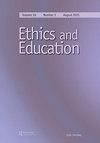Rethinking education to counter violent extremism: a critical review of policy and practice
IF 0.7
Q3 EDUCATION & EDUCATIONAL RESEARCH
引用次数: 0
Abstract
ABSTRACT This paper explores the alarming phenomenon of violent extremism in university campuses. It probes why education fails to prevent violent extremism in this case? Drawing on Robert Cox’s distinction of problem solving and critical theories, the paper examines policy discourses that aim to prevent violent extremism through education. It is observed that dominant policy discourses take up problem solving approaches to prevent/counter violent extremism and fail to take into account the broader structural violence that feeds extremist ideologies. The counter violent extremism policies largely view education as a means to control thinking rather than develop it. Such policies hinder the development of critical consciousness in students that can provide effective defence against extremism. Hence, there is a need to rethink education to counter extremism. Subsequently, the paper shifts its focus to Pakistan, where education has remained a central concern of counter extremism policies since 9/11. Based on 13 expert interviews, I explore higher education practices in Pakistan from practitioners’ perspective. The practitioners point out multiple problems of educational status quo that need to be addressed to counter extremism on campus effectively.反思教育以打击暴力极端主义:对政策和实践的批判性回顾
摘要本文探讨了大学校园中令人担忧的暴力极端主义现象。它探讨了为什么在这种情况下,教育不能阻止暴力极端主义?本文借鉴罗伯特·考克斯的问题解决理论和批判理论,考察了旨在通过教育预防暴力极端主义的政策话语。据观察,占主导地位的政策话语采用了解决问题的方法来预防/打击暴力极端主义,而没有考虑到助长极端主义意识形态的更广泛的结构性暴力。反暴力极端主义政策在很大程度上将教育视为一种控制思维的手段,而不是发展思维。这种政策阻碍了学生批判性意识的发展,从而为抵御极端主义提供有效的防御。因此,有必要重新思考打击极端主义的教育。随后,该文件将重点转移到巴基斯坦,自9/11以来,巴基斯坦的教育一直是反极端主义政策的核心问题。基于13次专家访谈,我从从业者的角度探讨了巴基斯坦的高等教育实践。从业人员指出,要有效打击校园极端主义,需要解决教育现状中的多个问题。
本文章由计算机程序翻译,如有差异,请以英文原文为准。
求助全文
约1分钟内获得全文
求助全文

 求助内容:
求助内容: 应助结果提醒方式:
应助结果提醒方式:


